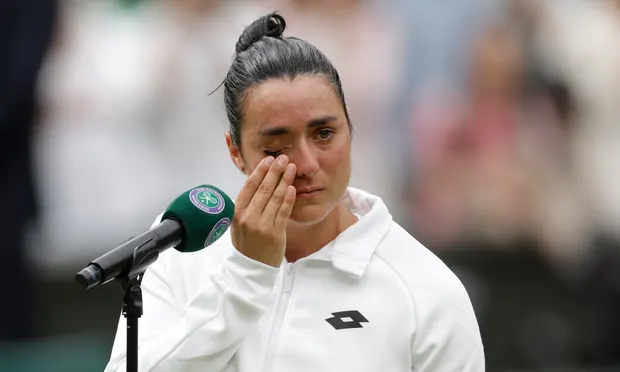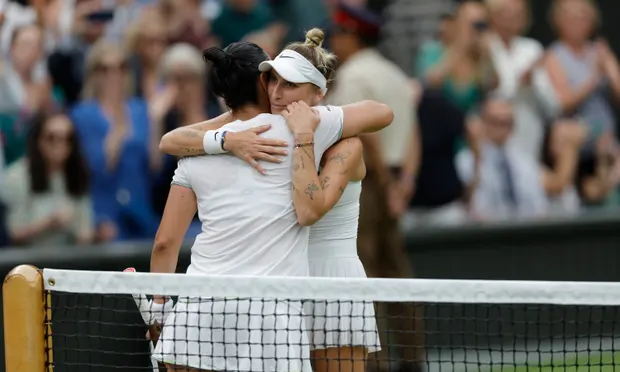Ons Jabeur has shown how to live with defeat – like it’s the end of the world

Obviously, you play to win. The only way to win is to lose like Ons Jabeur. Make sure you lose with conviction. You will be devoured by great, greedy sobs if you lose. Weep on Kate Middleton’s shoulder and try not to laugh at the irony of being counseled by a literal princess on the virtues of hard work and perseverance.
When you make twice as many unforced errors as your opponent, you lose a Wimbledon final. Make a joke about how ugly you are going to look crying on camera if you lose. Live life like you’re dying, and lose like you’re dying. Nobody really remembers who won when you lose so charmingly.
Marketa Vondrousova is a wonderful technician with a compelling backstory of heartbreak and restitution, but some athletes’ defeats are more compelling than their victories. Jabeur belongs to this group. It was clear what we were watching on Saturday wasn’t so much a tennis match as a performance theatre as a panorama of human turmoil and frailty, of ambition, emotion, and ultimately straight-sets defeat when the heavy favourite gave up a break advantage in the first set.
There is a lot of talk about bouncing back from defeat in sports. An entire canon of aphorisms and self-help literature is devoted to overcoming adversity: learning from failure, learning the right lessons, and coming back stronger. A redemption arc is one of the most popular plot devices among sportswriters. Books about failure don’t sell, according to a literary agent; readers want to aspire and feel empowered. Thus, we spend relatively little time talking about losing itself: what it means, how it feels. While she would desperately like it otherwise, Jabeur has mastered the art of losing.
As Annabel Croft tries to steer her back to more sanguine territory in her tearful on-court interview, she simply refuses to gloss over the pain of defeat, refuses to indulge in artifice, refuses to take the positives. Croft says, “You should be so proud of how well you played.”. Jabeur wants to continue. It is at this point that we should probably establish some ground rules since Jabeur is too busy being distraught to try to salve anyone else’s feelings. Specifically, we should distinguish between losing well and being a “good loser”. In late-Victorian Britain, moralistic crypto-imperial nonsense like this was supposedly tied to sportsmanship and fair play. Lips tucked in. Don’t be afraid to take it on. Thank you, old friend, for the handshake. As soon as you are ready, you will be able to vote.
Alternatively, losing well does not require stoicism or dignity, courteously congratulating your opponent or quietly accepting your fate. “Bad losers” can sometimes be the best losers. It is remarkable how brilliant José Mourinho is at losing. A ball of gnarled rage, Andy Murray has always been far more entertaining when he loses than when he wins: a man who has lost his shoes at a concert bellowing unintelligibly into the distance. I’ll take vengeful Serena over beatific Serena, and wounded and quivering Cristiano over “siuuuu” Cristiano.

There is no requirement to scream and rant, weep copiously into the camera, or accost the referee afterwards. It is better to play to win than to lose, like England’s cricketers after losing the women’s Ashes by a cruelly small margin. If you lose like Nat Sciver-Brunt, who tried to hit a six off the final ball, you’ll be like Nat Sciver-Brunt. Play in the greatest series in history with your best mates in front of capacity crowds and lose like Tammy Beaumont, unable to wipe the grin from her face.
Lose like Mark Cavendish, broken and sullen in the back of a team car as his Tour de France dreams crumble. In the end, Cavendish is more interesting when he loses: stripped back, stripped raw, uninterested in beige platitudes or words of comfort. There is no more poignant sight in golf than Rory McIlroy solemnly trudging up the back nine as he loses yet another major championship to some random American.
Across all of the above, there is an emotional authenticity that can never quite be captured by a viral video or streaming documentary. She is not only mourning her own defeat, but also the hopes of millions across Africa and the Arab world that were invested in her. The odds of her winning the grand slam she craves are slim despite all the optimistic prognoses, as the women’s game is rapidly changing.
She has gone through a lot to get where she is, and you know what it will take to give her another chance. To win anything, you must first lose everything.
